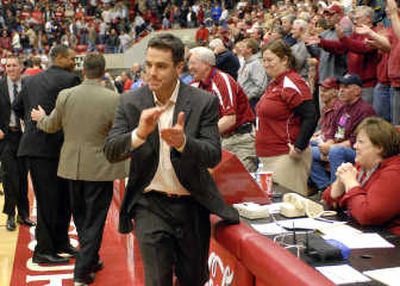Cougars traveled 18,000 miles to stay course

If you think March is a barometer of how far the basketball program at Washington State has come, well, of course you’re right. But June, July and August are closing fast.
This is because there is no off-season in college basketball anymore – hasn’t been for a while now – and because the Cougars are suddenly players. Or have players.
Players who are wanted, and players who want to be Cougs.
In a couple of weeks, seniors Derrick Low and Kyle Weaver will be off to Haverford, Pa., and the Team USA trials for the Pan American Games – two of 30 collegians trying to make a 12-man team that will play in Brazil later in the month.
In August, the Cougars could have as many as three players on different rosters in the World University Games in Bangkok – freshmen Thomas Abercrombie with New Zealand and Fabian Boeke with Germany, and junior Aron Baynes with Australia. Unless Baynes decides to play with the New Zealand national team, which he could since he was born there.
The Cougs finished 2007 ranked 11th in the nation, but they’re in the top 10 in passports.
And in a less far-flung development on Monday, the Cougars received a commitment from one Anthony Brown. That’s intriguing on a couple of fronts – because he’ll only be a junior at Shadle Park next year and because Wazzu hasn’t had a commit from a Spokane kid in 17 years.
Busy as they are, you wouldn’t think coach Tony Bennett would feel the need to find more to occupy his Cougs, but he managed to rustle up six games in 12 days and flew 18,000 miles to play them.
Maybe this is what George Raveling meant when he said you could see the end of the world from Pullman.
The Cougars’ exhibition trip to New Zealand and Australia was, by the coach’s accounting, both a critical and cultural success. Wazzu went 4-2 on the tour against national, club and academy teams – not that there was anything particular at stake.
“You wanted to win – there were some elite teams – and you certainly didn’t want to get into any bad habits,” Bennett said. “But you had to approach it with a little perspective. We’d have felt bad if we’d lost a couple more of them, but then it would be, ‘Hey, we’re going to the Great Barrier Reef.’ “
Not quite like losing in double overtime to Vanderbilt in the NCAA tournament, which wasn’t so easily washed away.
College teams can take these international tours once every four years, and while they’re often lauded as bonding agents, the practical analogy is that they are to the basketball team what spring practice is to football.
The Cougars had 10 days to practice before the trip. Bennett mixed and matched new combinations, tried and discarded new wrinkles and relearned old truths.
“Maybe the best thing for us was how physical those pro teams are,” he said. “And the officials let you play. They allow you to bump cutters and hold people away from the ball and that was a valuable thing for our guys to go against. It wasn’t even that those guys were huge, but it’s important to be able to play with contact.”
But it was also time invested now that Bennett wouldn’t have to waste later. The Cougars worked hard on some twists to their offense during the 10-day run-up and what Bennett discovered is “that they didn’t play to our strength. Our strengths are what we’ve done for four years. And that’s good to find out now instead of finding it out three games into the season. That saves us some time. We tried to run more pattern stuff and saw that our guys are better in motion rather than putting them in spots and painting by numbers.”
Indeed, sometimes it seemed as if this was a trip to the republic of reinforcement.
“The other thing we learned is that we can’t take our defense for granted,” Bennett said. “The points we were giving up just showed how that’s got to be a staple for us.”
The other lessons, however, were more subtle.
Giving Abercrombie and Baynes an opportunity to return home with their teammates in tow was a particular highlight for Bennett, on multiple fronts.
“I think it makes our other guys appreciate how hard it is for international athletes who don’t get to see their parents five or six times a year,” he said.
“Aron’s parents had not seen him for two years and they came to our second game, the first one in Australia, and watched every one of them. We ended the trip in his hometown and they had the whole team over and we just had a blast. We ate everything – even kangaroo. It was OK, too.”
Good for the hops, he has to hope.